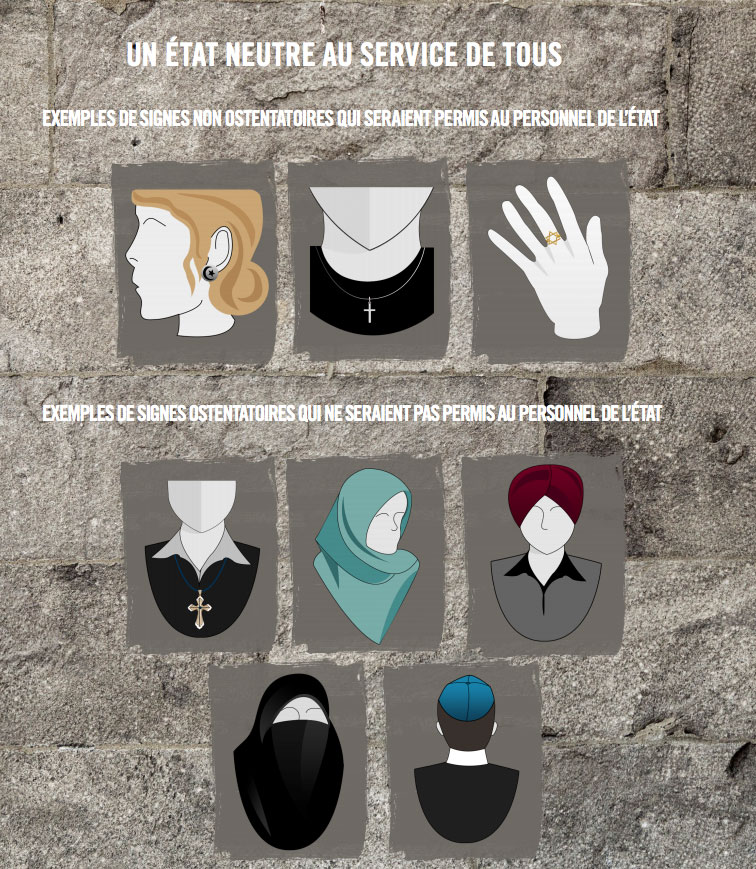Welcome to the Religious Freedom Recap, our weekly look back at the top stories and developments on religious liberty around the world. You can subscribe to receive the free Recap by email here. Don’t want to wait until Monday? Follow my Twitter stream @brianpellot for updates throughout the week.
Now without further ado, let’s review the week that was in #religiousfreedom.
As New York Fashion Week comes to a close, we start with clothes…bear with me.

An image released by the Quebec government showing, top three, “non-ostentatious” religious symbols that could be worn by public employees, and, bottom five images, “ostentatious” symbols that would be banned under the proposed Charter of Quebec Values. Photo courtesy Quebec government
Quebec introduced its controversial Charter of Values last week, which would prevent government workers from wearing “overt and conspicuous” religious symbols such as veils, turbans and yarmulkes in public. Some critics argue the proposed measure favors Judeo-Christian traditions at the expense of “immigrant faiths.”
A Muslim woman who was fired in 2010 for wearing a hijab while working at a California Abercrombie and Fitch store won her lawsuit when a federal judge ruled the chain had violated anti-discrimination guidelines. But in Sudan, a woman faces flogging this week for refusing to cover her hair.
A German court ruled that a Muslim girl must participate in co-ed swimming classes despite her parents’ insistence that doing so would violate their religious modesty standards. The court suggested the girl wear a “burkini,” but she says the compromise would still expose her to half-naked boys, and bullying.
Speaking of swimwear, pageant organizers worry they won’t have time to accommodate last-minute changes to the Miss World finals in Indonesia. The host government of this year’s competition decided to move the crowning ceremony from Jakarta to more liberal Bali last week amid sustained protest from conservative Islamic groups who consider the event a “whore contest” that exploits women.
In the U.K., a judge decided that a Muslim woman can wear her niqab in court. The same judge will decide today whether she must show her face in front of a jury. A Birmingham college dropped its controversial ban on face veils after more than 9,000 people signed an online petition calling for its repeal. And a minister of the Liberal Democrat party said the British government should consider banning young women from wearing veils in public.
In less controversial clothing news, Sikhs hosted a Turban Day in New York City last Sunday to counter misperceptions about their faith. Organizers tied brightly colored cloths around the heads of more than 700 passers-by in Union Square.
Sikhs are often mistaken for or confused with Muslims in America, as some of the first hate crimes after 9/11 made clear. The 12th anniversary of the 9/11 attacks was marked last week by several nearly non-existent marches and a nobody from nowhere stirring up hate.
In Washington, D.C., “Two Million Bikers” protested the “Million Muslim March,” later dubbed the “Million American March Against Fear.” In reality, a few thousand bikers and a few dozen Muslims showed up.
In Mulberry, Fla., Quran-burning pastor Terry Jones was arrested on charges of illegally transporting fuel and unlawfully carrying a firearm on his way to burn nearly 3,000 Qurans. Interfaith Muslim activist Mike Ghouse organized a memorial blood drive to counter the planned burning in the same small town. Elsewhere in Florida, a 9/11 memorial service morphed into more of an anti-Islam rally.
On the international stage, Pope Francis told atheists to “obey their conscience” in a letter he wrote to an Italian newspaper. RNS’ David Gibson argues that the op-ed wasn’t as controversial as it might have seemed.
In another op-ed, this one in The New York Times, Russian President Vladimir Putin criticized President Barack Obama’s claim that Americans are exceptional, stating that “when we ask for the Lord’s blessings, we must not forget that God created us equal.”
It’s unclear who Putin means by “us.” LGBT Russians? Probably not, considering the country’s new anti-gay law. Hare Krishnas? Probably not, considering reports that many face eviction after their land was recently confiscated in Moscow.
Protestant leaders in Bolivia opposed a new law that requires churches to re-register with the government, arguing that it “denies us the right to be a church” and infringes on their autonomy.
In Pakistan, dozens of Christian families fled from their village near Lahore after a local pastor was accused of blasphemy against the Prophet Muhammad.
Back in the U.S., a Hawaii judge issued a buzzkill ruling when she decided that the Hawaii Cannabis Ministry couldn’t use a religious defense against federal charges of producing and trafficking pot.
After his recent “mild pedophilia” remarks, Richard Dawkins said some other slightly confusing and controversial things. The often aggressive atheist said in an interview:
“I certainly would absolutely never do what some of my American colleagues do and object to religious symbols being used, putting crosses up in the public square and things like that, I don’t fret about that at all, I’m quite happy about that.”
Many atheists won’t be happy to learn that a U.S. district judge decided the phrase “In God We Trust” is constitutionally permissible on American money. Plaintiffs in the case, including the Freedom From Religion Foundation, had argued they were “forced to proselytize for Monotheism” when traveling abroad and exchanging their dollars.
A Michigan bill, hailed by some for supporting religious freedom, could allow adoption agencies to refuse to place children in homes based on a family’s religious or moral beliefs. Opponents of the vaguely written bill were quick to point out that religious freedom for agencies could mean discrimination against potential parents.
A few quick institutional updates:
Robert P. George officially took over as chairman of the U.S. Commission on International Religious Freedom. He wrote a column last week on how governments can fight terrorism with religious freedom. For a different take, read Elizabeth Shakman Hurd’s column (paywall) from June on what’s wrong with governments promoting religious freedom. The Northwestern prof will be releasing a new paper on that topic this Friday.
The Church of Jesus Christ of Latter-day Saints launched a new religious freedom campaign. The videos and resources are well worth a skim, but I question how effective the church will be at reaching out to nonbelievers. In a blog, I asked readers: Does religious freedom require civility? Or does a requirement of civility hamper religious freedom? Check out the comments section and chime in.
The Guardian had a poll of its own last week, asking readers, “Do you think atheists are winning the war against religion?” 71 percent of respondents said yes. The poll is closed, but tell us what you think below.
And while you’re at it, sign up to get next week’s Recap delivered straight to your inbox.





